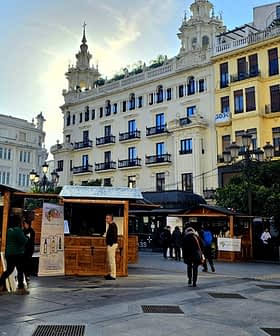Spanish table olives will be promoted in ten countries during 2012, according to cooperation agreements signed by the Table Olive Interprofessional Organization (lnteraceituna) with the Spanish Foreign Trade Institute (ICEX), the Trade Promotion Agency of Andalusia (Extenda) and Extremadura Avante.
The promotional activities during 2012 will be held in ten locations including Hungary, Slovakia, Australia, France, Mexico, Poland, United Kingdom, Czech Republic, Russia and Ukraine. The budget is around two million euros, according to Interaceituna.
These activities include promotion at the point of sale, gastronomic shows, culinary workshops, publishing agreements and presence in international food fairs as well as creating web content, developing social networks and blogs.
The objective of the initiative is to promote the nutritional properties of olives and their versatility and to form a direct association between the olives and their place of origin.
To meet these objectives, the initiative will also count on international chefs such as Benjamin Darnaud, who will participate in France; Adrián Quetglas, in Russia; Andrej Polan, in Poland; Omar Allibhoyin United Kingdom; and Enrique Sánchez in the other countries.
Promotions carried out in major supermarket chains have already pushed the presence of spanish table olives at the time of purchase. Indeed, in 2011, 2,500 hours of promotion and tasting activities were carried out, according to the organizers.
As lnteraceituna pointed out, Spain is a leading export and producer of table olives, making it an international reference and allowing the brand Olives from Spain to consolidate.
Is mechanized harvesting the solution to increasing competitiveness?
At the same time, the deputy director of the Spanish Association of Exporters and Manufacturers of Table Olives (Asemesa), Jose Manuel Escrig has defended the adoption of mechanized harvesting to increase the competitiveness of the sector and stabilize and increase sales.
Escrig spoke at the University of Cordoba where he has shared with students his ideas about the industry position of table olives with these new techniques of mechanized harvesting.
During his speech, Escrig outlined the current situation in the field of table olives and recalled that the Spanish leadership is threatened by factors such as loss of market share to the emergence of new producing and exporting countries, the decrease of domestic consumption and the increase in stocks from the last harvest.
In this situation, he has insisted on the gradual introduction of new harvesting techniques, due to the “impossibility” of hand-picking methods in the actual economic scenario.
In his opinion, most of the traditional olive plantations will not be sustainable if they are not mechanized and he finds it absolutely necessary to modernize them in order to adapt the land to mechanization.








